Lidl Case Study: An Investigation into Production Waste and Reputation
VerifiedAdded on 2023/06/15
|13
|2495
|436
Case Study
AI Summary
This case study investigates the impact of production waste on Lidl's brand reputation in the retail industry. It explores the concept of brand perception, its relationship with waste production, and the challenges in improving brand image through effective waste management. The research employs a positivism philosophy, using questionnaires to gather data on awareness of brand reputation, the benefits of a strong brand, the impact of ineffective waste disposal, and the challenges in managing production waste. The findings highlight that ineffective waste management can harm brand reputation by creating an unsustainable image and affecting consumer perception of product quality. The study recommends that Lidl invest in improving waste management infrastructure, such as waste separation facilities, to enable employees to effectively minimize and dispose of production waste, ultimately enhancing the company's brand reputation.
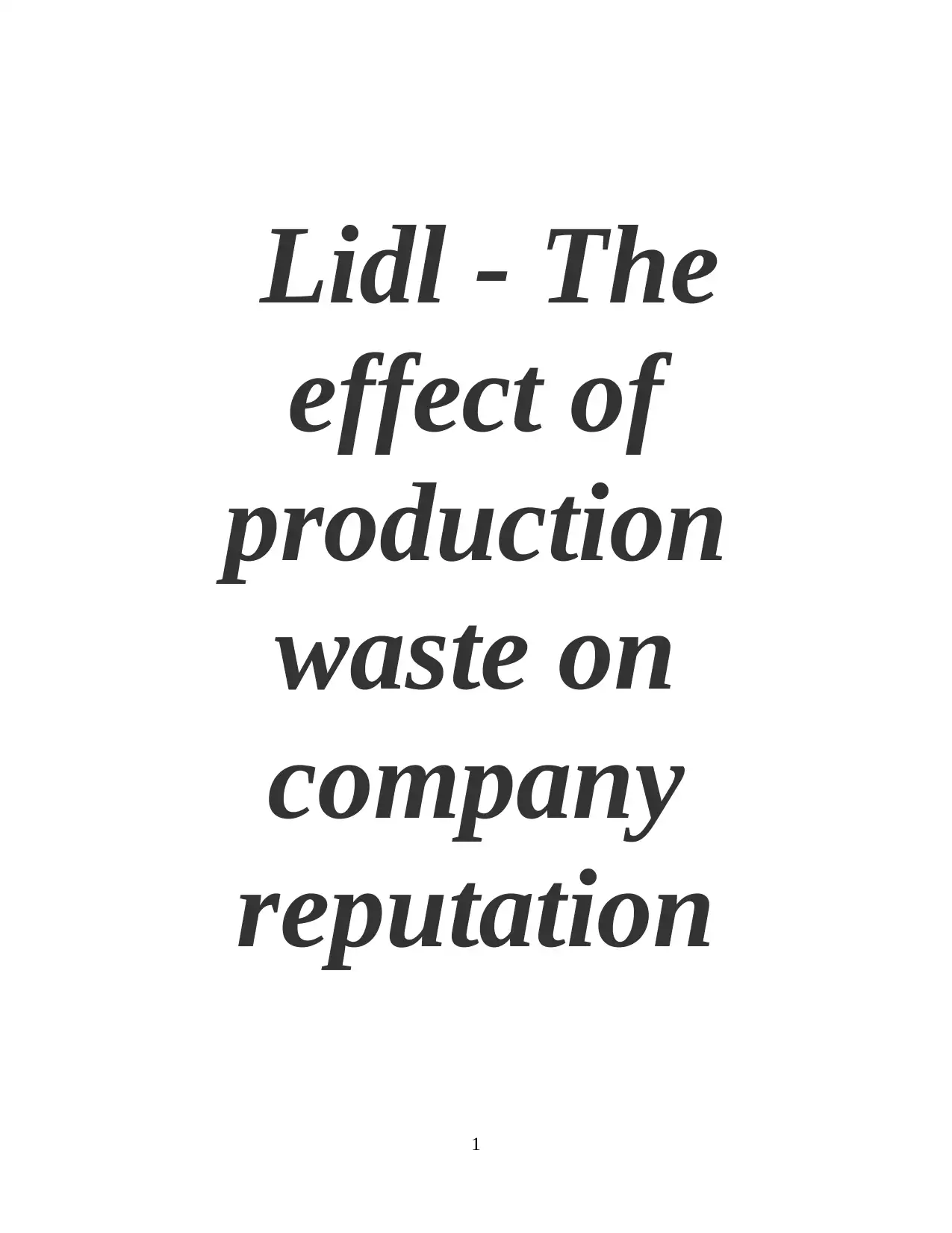
Lidl - The
effect of
production
waste on
company
reputation
1
effect of
production
waste on
company
reputation
1
Paraphrase This Document
Need a fresh take? Get an instant paraphrase of this document with our AI Paraphraser
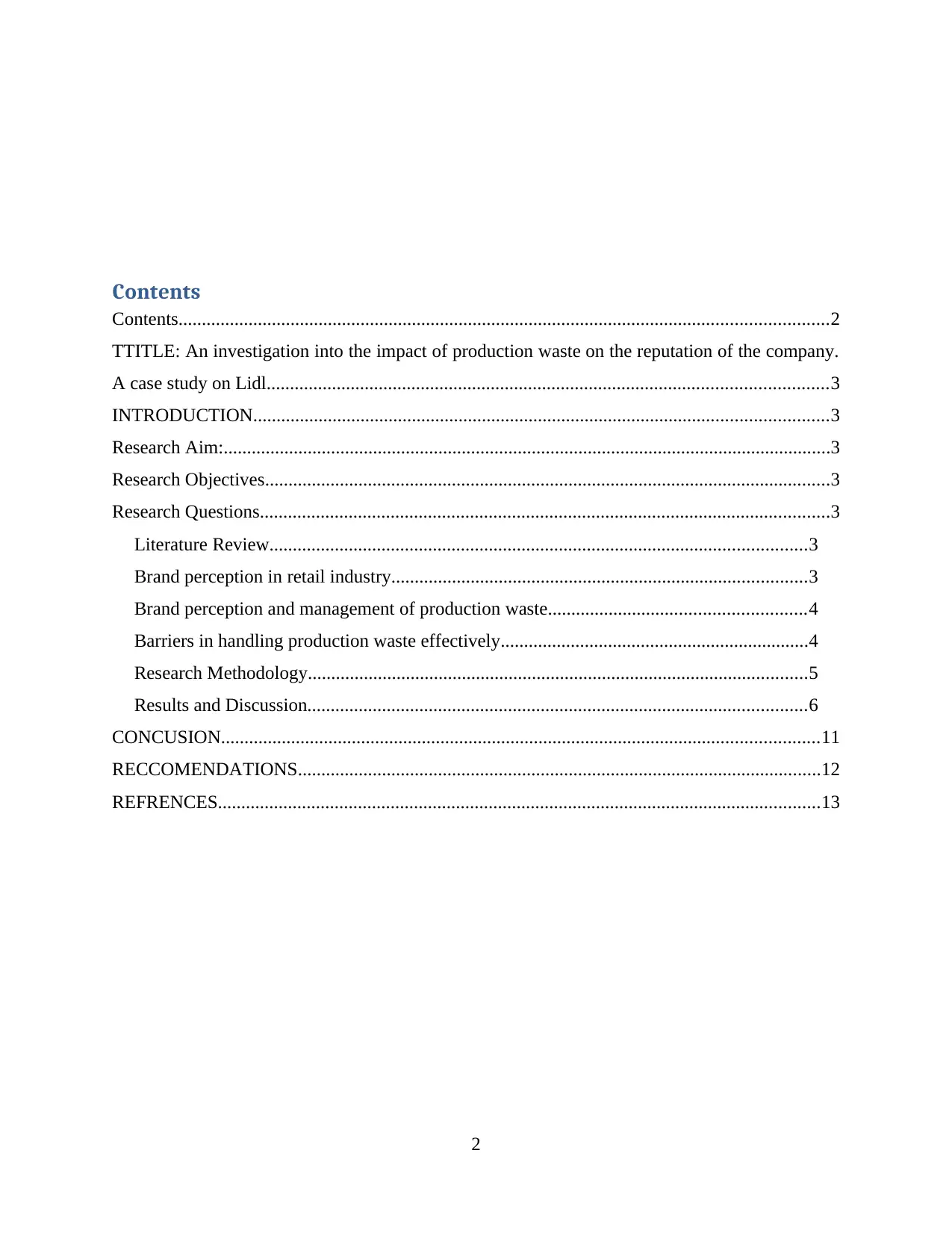
Contents
Contents...........................................................................................................................................2
TTITLE: An investigation into the impact of production waste on the reputation of the company.
A case study on Lidl........................................................................................................................3
INTRODUCTION...........................................................................................................................3
Research Aim:..................................................................................................................................3
Research Objectives.........................................................................................................................3
Research Questions..........................................................................................................................3
Literature Review...................................................................................................................3
Brand perception in retail industry.........................................................................................3
Brand perception and management of production waste.......................................................4
Barriers in handling production waste effectively..................................................................4
Research Methodology...........................................................................................................5
Results and Discussion...........................................................................................................6
CONCUSION................................................................................................................................11
RECCOMENDATIONS................................................................................................................12
REFRENCES.................................................................................................................................13
2
Contents...........................................................................................................................................2
TTITLE: An investigation into the impact of production waste on the reputation of the company.
A case study on Lidl........................................................................................................................3
INTRODUCTION...........................................................................................................................3
Research Aim:..................................................................................................................................3
Research Objectives.........................................................................................................................3
Research Questions..........................................................................................................................3
Literature Review...................................................................................................................3
Brand perception in retail industry.........................................................................................3
Brand perception and management of production waste.......................................................4
Barriers in handling production waste effectively..................................................................4
Research Methodology...........................................................................................................5
Results and Discussion...........................................................................................................6
CONCUSION................................................................................................................................11
RECCOMENDATIONS................................................................................................................12
REFRENCES.................................................................................................................................13
2
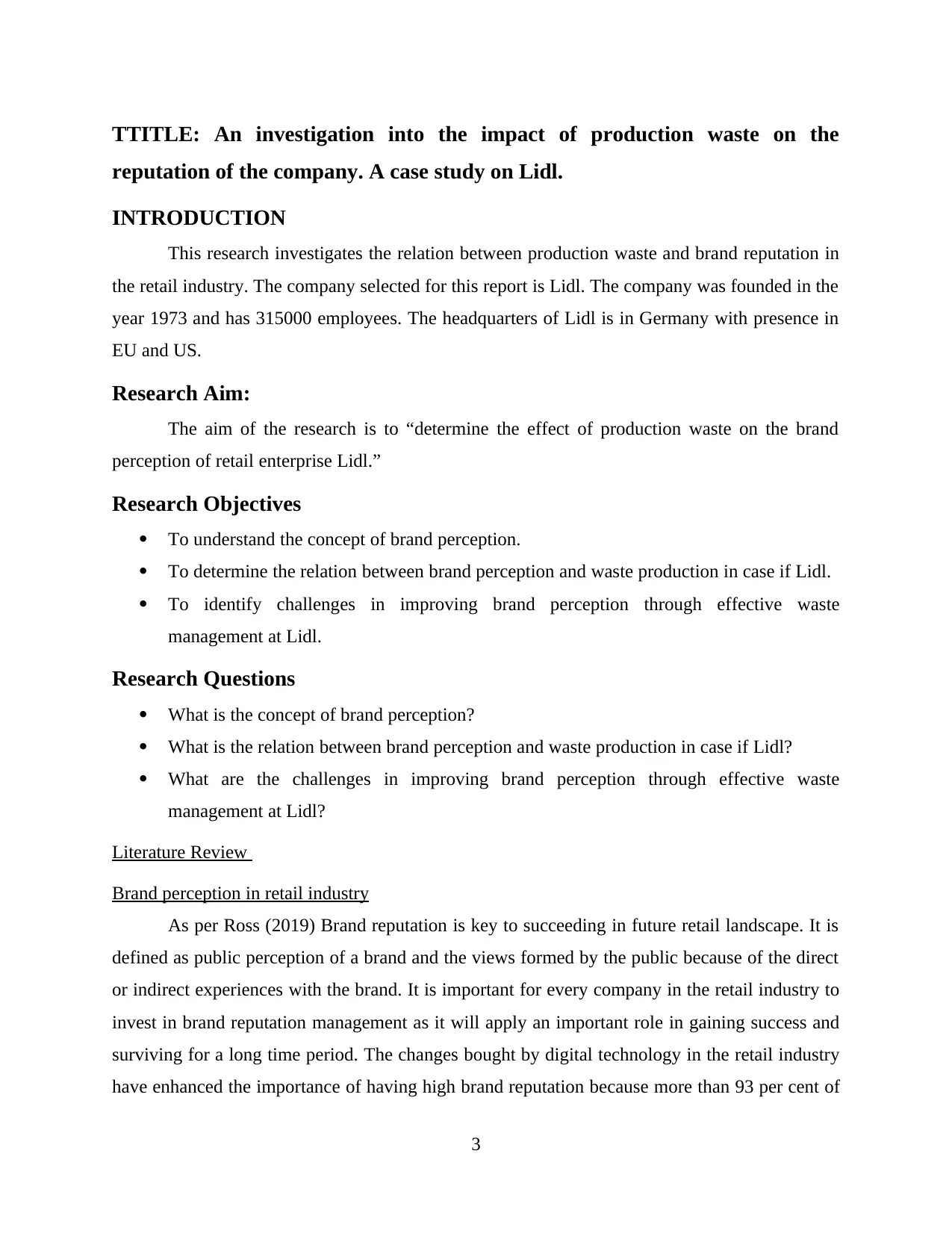
TTITLE: An investigation into the impact of production waste on the
reputation of the company. A case study on Lidl.
INTRODUCTION
This research investigates the relation between production waste and brand reputation in
the retail industry. The company selected for this report is Lidl. The company was founded in the
year 1973 and has 315000 employees. The headquarters of Lidl is in Germany with presence in
EU and US.
Research Aim:
The aim of the research is to “determine the effect of production waste on the brand
perception of retail enterprise Lidl.”
Research Objectives
To understand the concept of brand perception.
To determine the relation between brand perception and waste production in case if Lidl.
To identify challenges in improving brand perception through effective waste
management at Lidl.
Research Questions
What is the concept of brand perception?
What is the relation between brand perception and waste production in case if Lidl?
What are the challenges in improving brand perception through effective waste
management at Lidl?
Literature Review
Brand perception in retail industry
As per Ross (2019) Brand reputation is key to succeeding in future retail landscape. It is
defined as public perception of a brand and the views formed by the public because of the direct
or indirect experiences with the brand. It is important for every company in the retail industry to
invest in brand reputation management as it will apply an important role in gaining success and
surviving for a long time period. The changes bought by digital technology in the retail industry
have enhanced the importance of having high brand reputation because more than 93 per cent of
3
reputation of the company. A case study on Lidl.
INTRODUCTION
This research investigates the relation between production waste and brand reputation in
the retail industry. The company selected for this report is Lidl. The company was founded in the
year 1973 and has 315000 employees. The headquarters of Lidl is in Germany with presence in
EU and US.
Research Aim:
The aim of the research is to “determine the effect of production waste on the brand
perception of retail enterprise Lidl.”
Research Objectives
To understand the concept of brand perception.
To determine the relation between brand perception and waste production in case if Lidl.
To identify challenges in improving brand perception through effective waste
management at Lidl.
Research Questions
What is the concept of brand perception?
What is the relation between brand perception and waste production in case if Lidl?
What are the challenges in improving brand perception through effective waste
management at Lidl?
Literature Review
Brand perception in retail industry
As per Ross (2019) Brand reputation is key to succeeding in future retail landscape. It is
defined as public perception of a brand and the views formed by the public because of the direct
or indirect experiences with the brand. It is important for every company in the retail industry to
invest in brand reputation management as it will apply an important role in gaining success and
surviving for a long time period. The changes bought by digital technology in the retail industry
have enhanced the importance of having high brand reputation because more than 93 per cent of
3
⊘ This is a preview!⊘
Do you want full access?
Subscribe today to unlock all pages.

Trusted by 1+ million students worldwide
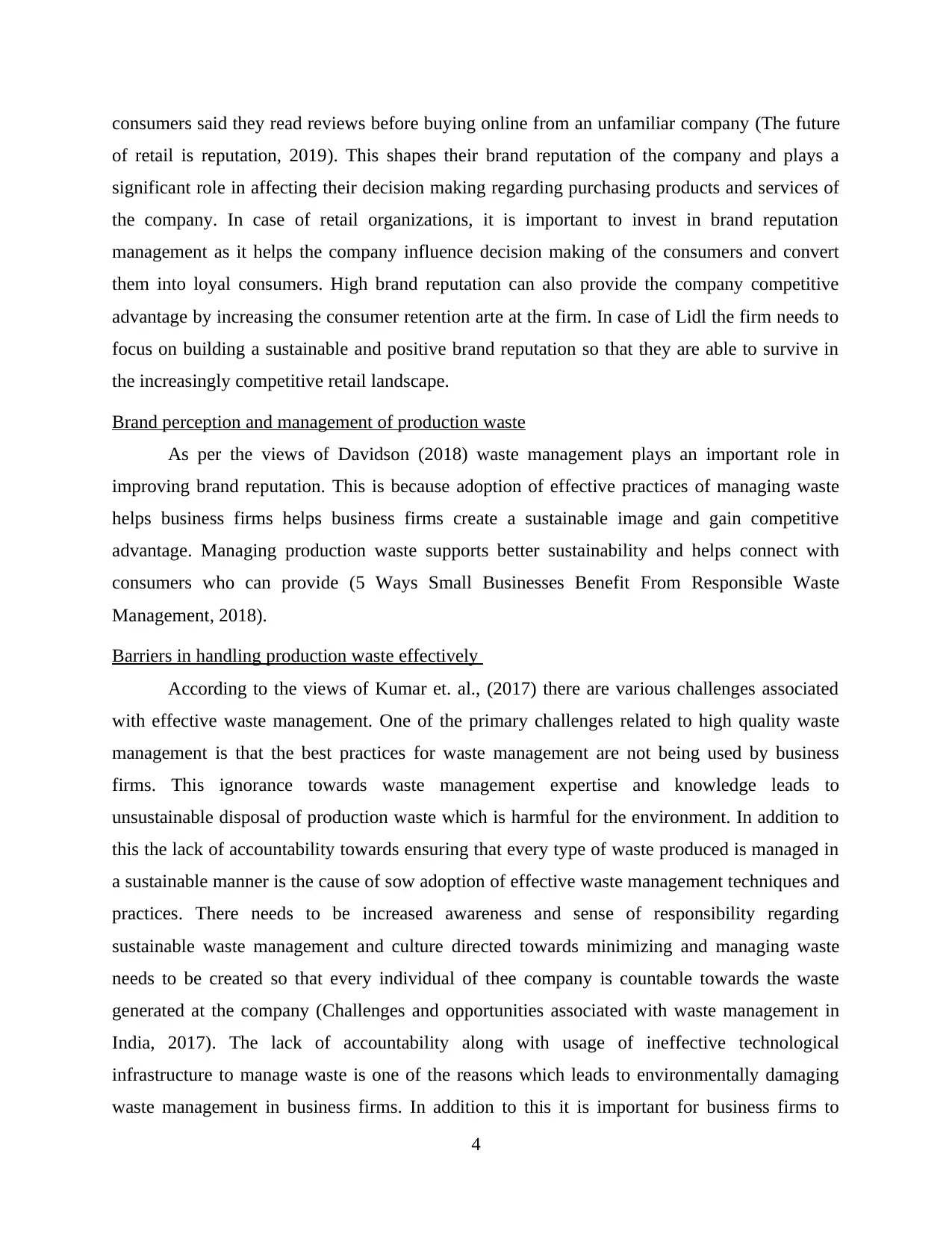
consumers said they read reviews before buying online from an unfamiliar company (The future
of retail is reputation, 2019). This shapes their brand reputation of the company and plays a
significant role in affecting their decision making regarding purchasing products and services of
the company. In case of retail organizations, it is important to invest in brand reputation
management as it helps the company influence decision making of the consumers and convert
them into loyal consumers. High brand reputation can also provide the company competitive
advantage by increasing the consumer retention arte at the firm. In case of Lidl the firm needs to
focus on building a sustainable and positive brand reputation so that they are able to survive in
the increasingly competitive retail landscape.
Brand perception and management of production waste
As per the views of Davidson (2018) waste management plays an important role in
improving brand reputation. This is because adoption of effective practices of managing waste
helps business firms helps business firms create a sustainable image and gain competitive
advantage. Managing production waste supports better sustainability and helps connect with
consumers who can provide (5 Ways Small Businesses Benefit From Responsible Waste
Management, 2018).
Barriers in handling production waste effectively
According to the views of Kumar et. al., (2017) there are various challenges associated
with effective waste management. One of the primary challenges related to high quality waste
management is that the best practices for waste management are not being used by business
firms. This ignorance towards waste management expertise and knowledge leads to
unsustainable disposal of production waste which is harmful for the environment. In addition to
this the lack of accountability towards ensuring that every type of waste produced is managed in
a sustainable manner is the cause of sow adoption of effective waste management techniques and
practices. There needs to be increased awareness and sense of responsibility regarding
sustainable waste management and culture directed towards minimizing and managing waste
needs to be created so that every individual of thee company is countable towards the waste
generated at the company (Challenges and opportunities associated with waste management in
India, 2017). The lack of accountability along with usage of ineffective technological
infrastructure to manage waste is one of the reasons which leads to environmentally damaging
waste management in business firms. In addition to this it is important for business firms to
4
of retail is reputation, 2019). This shapes their brand reputation of the company and plays a
significant role in affecting their decision making regarding purchasing products and services of
the company. In case of retail organizations, it is important to invest in brand reputation
management as it helps the company influence decision making of the consumers and convert
them into loyal consumers. High brand reputation can also provide the company competitive
advantage by increasing the consumer retention arte at the firm. In case of Lidl the firm needs to
focus on building a sustainable and positive brand reputation so that they are able to survive in
the increasingly competitive retail landscape.
Brand perception and management of production waste
As per the views of Davidson (2018) waste management plays an important role in
improving brand reputation. This is because adoption of effective practices of managing waste
helps business firms helps business firms create a sustainable image and gain competitive
advantage. Managing production waste supports better sustainability and helps connect with
consumers who can provide (5 Ways Small Businesses Benefit From Responsible Waste
Management, 2018).
Barriers in handling production waste effectively
According to the views of Kumar et. al., (2017) there are various challenges associated
with effective waste management. One of the primary challenges related to high quality waste
management is that the best practices for waste management are not being used by business
firms. This ignorance towards waste management expertise and knowledge leads to
unsustainable disposal of production waste which is harmful for the environment. In addition to
this the lack of accountability towards ensuring that every type of waste produced is managed in
a sustainable manner is the cause of sow adoption of effective waste management techniques and
practices. There needs to be increased awareness and sense of responsibility regarding
sustainable waste management and culture directed towards minimizing and managing waste
needs to be created so that every individual of thee company is countable towards the waste
generated at the company (Challenges and opportunities associated with waste management in
India, 2017). The lack of accountability along with usage of ineffective technological
infrastructure to manage waste is one of the reasons which leads to environmentally damaging
waste management in business firms. In addition to this it is important for business firms to
4
Paraphrase This Document
Need a fresh take? Get an instant paraphrase of this document with our AI Paraphraser
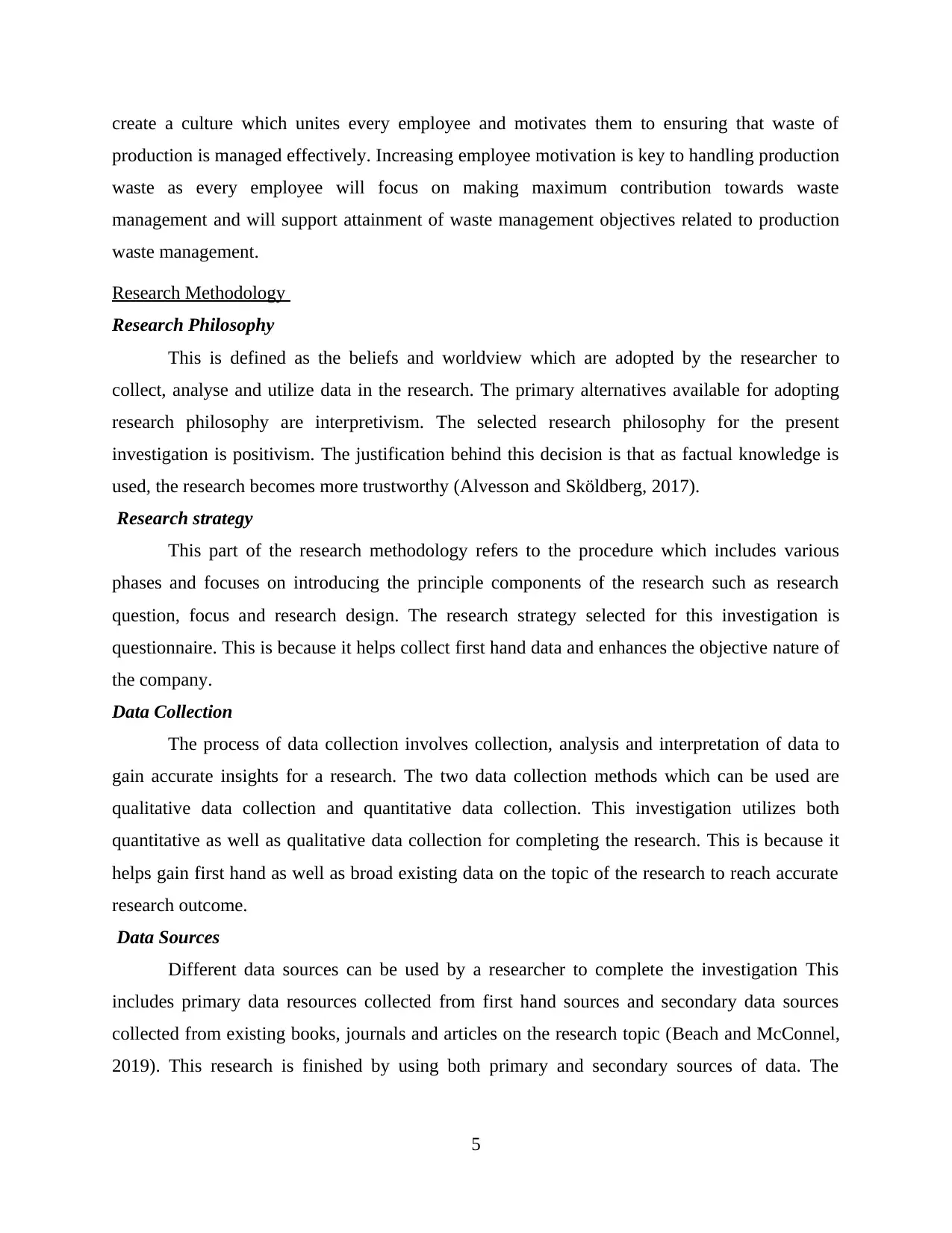
create a culture which unites every employee and motivates them to ensuring that waste of
production is managed effectively. Increasing employee motivation is key to handling production
waste as every employee will focus on making maximum contribution towards waste
management and will support attainment of waste management objectives related to production
waste management.
Research Methodology
Research Philosophy
This is defined as the beliefs and worldview which are adopted by the researcher to
collect, analyse and utilize data in the research. The primary alternatives available for adopting
research philosophy are interpretivism. The selected research philosophy for the present
investigation is positivism. The justification behind this decision is that as factual knowledge is
used, the research becomes more trustworthy (Alvesson and Sköldberg, 2017).
Research strategy
This part of the research methodology refers to the procedure which includes various
phases and focuses on introducing the principle components of the research such as research
question, focus and research design. The research strategy selected for this investigation is
questionnaire. This is because it helps collect first hand data and enhances the objective nature of
the company.
Data Collection
The process of data collection involves collection, analysis and interpretation of data to
gain accurate insights for a research. The two data collection methods which can be used are
qualitative data collection and quantitative data collection. This investigation utilizes both
quantitative as well as qualitative data collection for completing the research. This is because it
helps gain first hand as well as broad existing data on the topic of the research to reach accurate
research outcome.
Data Sources
Different data sources can be used by a researcher to complete the investigation This
includes primary data resources collected from first hand sources and secondary data sources
collected from existing books, journals and articles on the research topic (Beach and McConnel,
2019). This research is finished by using both primary and secondary sources of data. The
5
production is managed effectively. Increasing employee motivation is key to handling production
waste as every employee will focus on making maximum contribution towards waste
management and will support attainment of waste management objectives related to production
waste management.
Research Methodology
Research Philosophy
This is defined as the beliefs and worldview which are adopted by the researcher to
collect, analyse and utilize data in the research. The primary alternatives available for adopting
research philosophy are interpretivism. The selected research philosophy for the present
investigation is positivism. The justification behind this decision is that as factual knowledge is
used, the research becomes more trustworthy (Alvesson and Sköldberg, 2017).
Research strategy
This part of the research methodology refers to the procedure which includes various
phases and focuses on introducing the principle components of the research such as research
question, focus and research design. The research strategy selected for this investigation is
questionnaire. This is because it helps collect first hand data and enhances the objective nature of
the company.
Data Collection
The process of data collection involves collection, analysis and interpretation of data to
gain accurate insights for a research. The two data collection methods which can be used are
qualitative data collection and quantitative data collection. This investigation utilizes both
quantitative as well as qualitative data collection for completing the research. This is because it
helps gain first hand as well as broad existing data on the topic of the research to reach accurate
research outcome.
Data Sources
Different data sources can be used by a researcher to complete the investigation This
includes primary data resources collected from first hand sources and secondary data sources
collected from existing books, journals and articles on the research topic (Beach and McConnel,
2019). This research is finished by using both primary and secondary sources of data. The
5
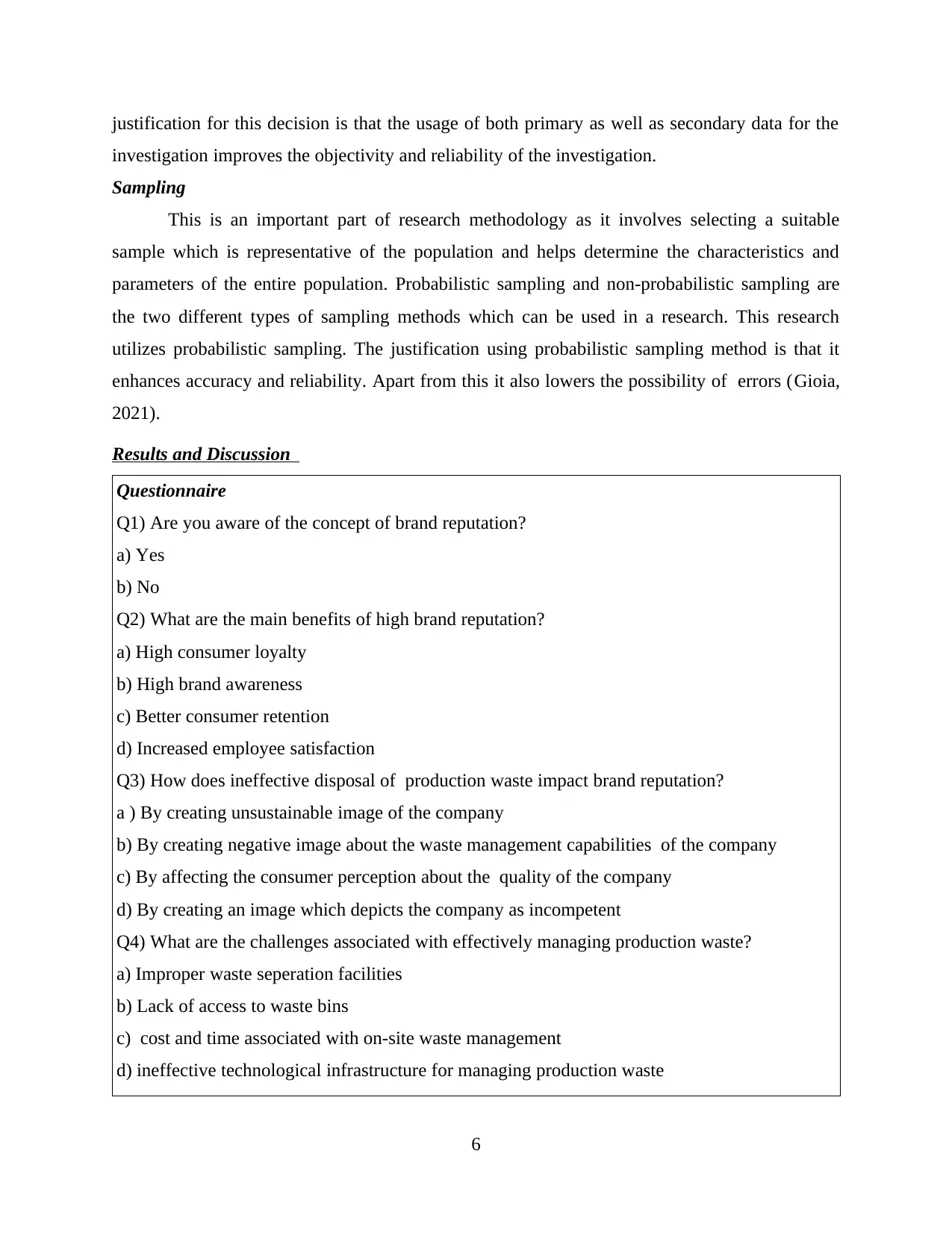
justification for this decision is that the usage of both primary as well as secondary data for the
investigation improves the objectivity and reliability of the investigation.
Sampling
This is an important part of research methodology as it involves selecting a suitable
sample which is representative of the population and helps determine the characteristics and
parameters of the entire population. Probabilistic sampling and non-probabilistic sampling are
the two different types of sampling methods which can be used in a research. This research
utilizes probabilistic sampling. The justification using probabilistic sampling method is that it
enhances accuracy and reliability. Apart from this it also lowers the possibility of errors (Gioia,
2021).
Results and Discussion
Questionnaire
Q1) Are you aware of the concept of brand reputation?
a) Yes
b) No
Q2) What are the main benefits of high brand reputation?
a) High consumer loyalty
b) High brand awareness
c) Better consumer retention
d) Increased employee satisfaction
Q3) How does ineffective disposal of production waste impact brand reputation?
a ) By creating unsustainable image of the company
b) By creating negative image about the waste management capabilities of the company
c) By affecting the consumer perception about the quality of the company
d) By creating an image which depicts the company as incompetent
Q4) What are the challenges associated with effectively managing production waste?
a) Improper waste seperation facilities
b) Lack of access to waste bins
c) cost and time associated with on-site waste management
d) ineffective technological infrastructure for managing production waste
6
investigation improves the objectivity and reliability of the investigation.
Sampling
This is an important part of research methodology as it involves selecting a suitable
sample which is representative of the population and helps determine the characteristics and
parameters of the entire population. Probabilistic sampling and non-probabilistic sampling are
the two different types of sampling methods which can be used in a research. This research
utilizes probabilistic sampling. The justification using probabilistic sampling method is that it
enhances accuracy and reliability. Apart from this it also lowers the possibility of errors (Gioia,
2021).
Results and Discussion
Questionnaire
Q1) Are you aware of the concept of brand reputation?
a) Yes
b) No
Q2) What are the main benefits of high brand reputation?
a) High consumer loyalty
b) High brand awareness
c) Better consumer retention
d) Increased employee satisfaction
Q3) How does ineffective disposal of production waste impact brand reputation?
a ) By creating unsustainable image of the company
b) By creating negative image about the waste management capabilities of the company
c) By affecting the consumer perception about the quality of the company
d) By creating an image which depicts the company as incompetent
Q4) What are the challenges associated with effectively managing production waste?
a) Improper waste seperation facilities
b) Lack of access to waste bins
c) cost and time associated with on-site waste management
d) ineffective technological infrastructure for managing production waste
6
⊘ This is a preview!⊘
Do you want full access?
Subscribe today to unlock all pages.

Trusted by 1+ million students worldwide
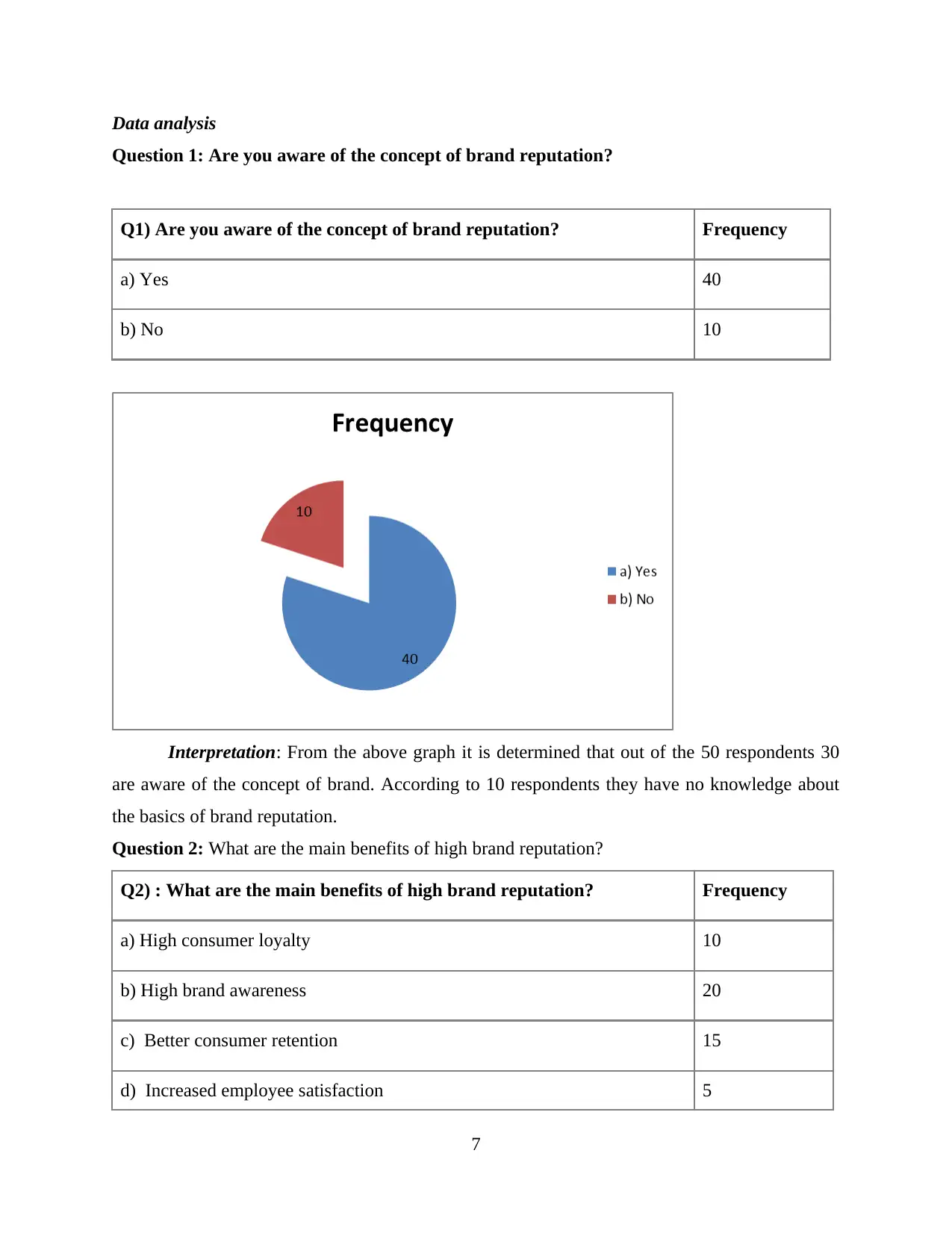
Data analysis
Question 1: Are you aware of the concept of brand reputation?
Q1) Are you aware of the concept of brand reputation? Frequency
a) Yes 40
b) No 10
Interpretation: From the above graph it is determined that out of the 50 respondents 30
are aware of the concept of brand. According to 10 respondents they have no knowledge about
the basics of brand reputation.
Question 2: What are the main benefits of high brand reputation?
Q2) : What are the main benefits of high brand reputation? Frequency
a) High consumer loyalty 10
b) High brand awareness 20
c) Better consumer retention 15
d) Increased employee satisfaction 5
7
Question 1: Are you aware of the concept of brand reputation?
Q1) Are you aware of the concept of brand reputation? Frequency
a) Yes 40
b) No 10
Interpretation: From the above graph it is determined that out of the 50 respondents 30
are aware of the concept of brand. According to 10 respondents they have no knowledge about
the basics of brand reputation.
Question 2: What are the main benefits of high brand reputation?
Q2) : What are the main benefits of high brand reputation? Frequency
a) High consumer loyalty 10
b) High brand awareness 20
c) Better consumer retention 15
d) Increased employee satisfaction 5
7
Paraphrase This Document
Need a fresh take? Get an instant paraphrase of this document with our AI Paraphraser
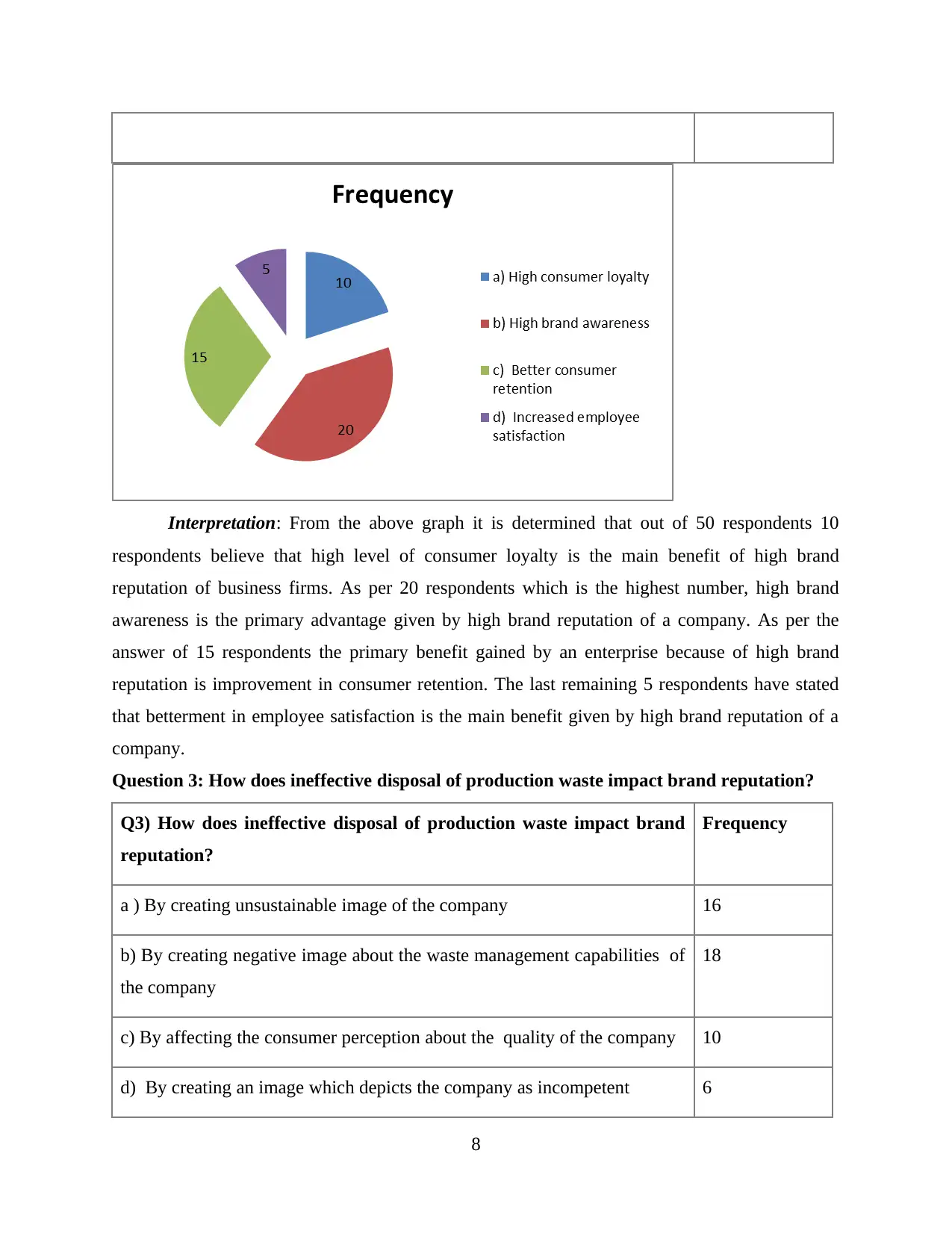
Interpretation: From the above graph it is determined that out of 50 respondents 10
respondents believe that high level of consumer loyalty is the main benefit of high brand
reputation of business firms. As per 20 respondents which is the highest number, high brand
awareness is the primary advantage given by high brand reputation of a company. As per the
answer of 15 respondents the primary benefit gained by an enterprise because of high brand
reputation is improvement in consumer retention. The last remaining 5 respondents have stated
that betterment in employee satisfaction is the main benefit given by high brand reputation of a
company.
Question 3: How does ineffective disposal of production waste impact brand reputation?
Q3) How does ineffective disposal of production waste impact brand
reputation?
Frequency
a ) By creating unsustainable image of the company 16
b) By creating negative image about the waste management capabilities of
the company
18
c) By affecting the consumer perception about the quality of the company 10
d) By creating an image which depicts the company as incompetent 6
8
respondents believe that high level of consumer loyalty is the main benefit of high brand
reputation of business firms. As per 20 respondents which is the highest number, high brand
awareness is the primary advantage given by high brand reputation of a company. As per the
answer of 15 respondents the primary benefit gained by an enterprise because of high brand
reputation is improvement in consumer retention. The last remaining 5 respondents have stated
that betterment in employee satisfaction is the main benefit given by high brand reputation of a
company.
Question 3: How does ineffective disposal of production waste impact brand reputation?
Q3) How does ineffective disposal of production waste impact brand
reputation?
Frequency
a ) By creating unsustainable image of the company 16
b) By creating negative image about the waste management capabilities of
the company
18
c) By affecting the consumer perception about the quality of the company 10
d) By creating an image which depicts the company as incompetent 6
8
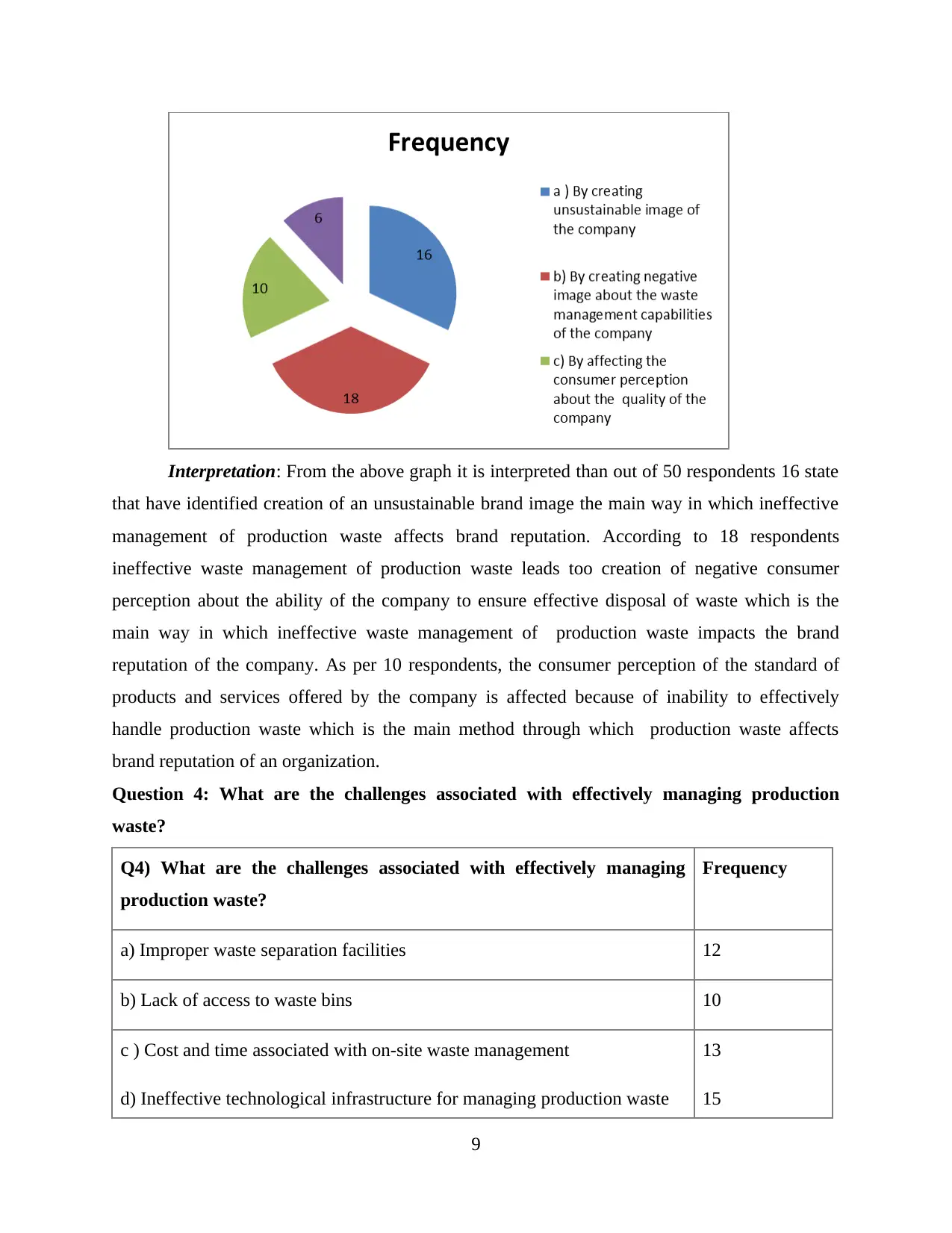
Interpretation: From the above graph it is interpreted than out of 50 respondents 16 state
that have identified creation of an unsustainable brand image the main way in which ineffective
management of production waste affects brand reputation. According to 18 respondents
ineffective waste management of production waste leads too creation of negative consumer
perception about the ability of the company to ensure effective disposal of waste which is the
main way in which ineffective waste management of production waste impacts the brand
reputation of the company. As per 10 respondents, the consumer perception of the standard of
products and services offered by the company is affected because of inability to effectively
handle production waste which is the main method through which production waste affects
brand reputation of an organization.
Question 4: What are the challenges associated with effectively managing production
waste?
Q4) What are the challenges associated with effectively managing
production waste?
Frequency
a) Improper waste separation facilities 12
b) Lack of access to waste bins 10
c ) Cost and time associated with on-site waste management 13
d) Ineffective technological infrastructure for managing production waste 15
9
that have identified creation of an unsustainable brand image the main way in which ineffective
management of production waste affects brand reputation. According to 18 respondents
ineffective waste management of production waste leads too creation of negative consumer
perception about the ability of the company to ensure effective disposal of waste which is the
main way in which ineffective waste management of production waste impacts the brand
reputation of the company. As per 10 respondents, the consumer perception of the standard of
products and services offered by the company is affected because of inability to effectively
handle production waste which is the main method through which production waste affects
brand reputation of an organization.
Question 4: What are the challenges associated with effectively managing production
waste?
Q4) What are the challenges associated with effectively managing
production waste?
Frequency
a) Improper waste separation facilities 12
b) Lack of access to waste bins 10
c ) Cost and time associated with on-site waste management 13
d) Ineffective technological infrastructure for managing production waste 15
9
⊘ This is a preview!⊘
Do you want full access?
Subscribe today to unlock all pages.

Trusted by 1+ million students worldwide
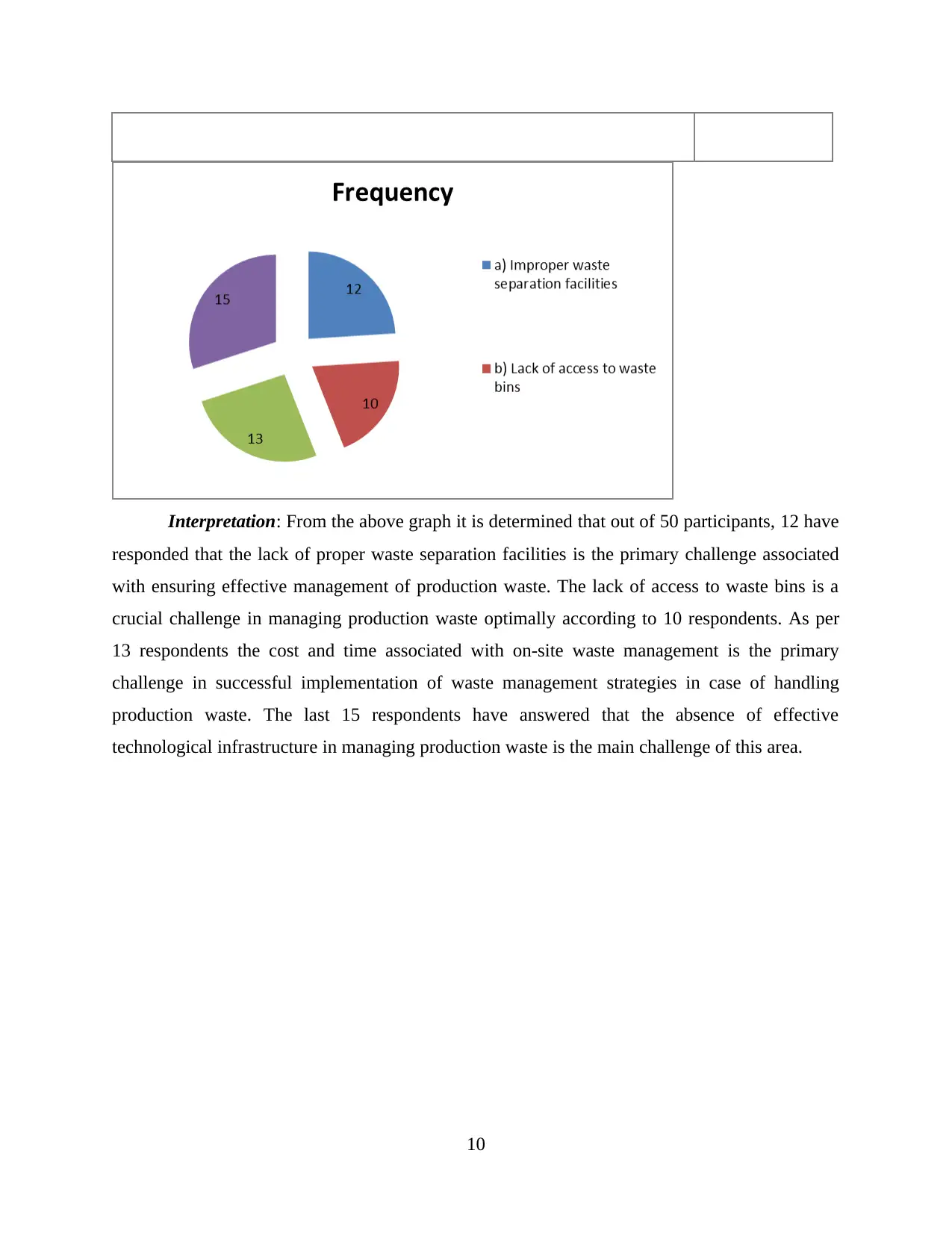
Interpretation: From the above graph it is determined that out of 50 participants, 12 have
responded that the lack of proper waste separation facilities is the primary challenge associated
with ensuring effective management of production waste. The lack of access to waste bins is a
crucial challenge in managing production waste optimally according to 10 respondents. As per
13 respondents the cost and time associated with on-site waste management is the primary
challenge in successful implementation of waste management strategies in case of handling
production waste. The last 15 respondents have answered that the absence of effective
technological infrastructure in managing production waste is the main challenge of this area.
10
responded that the lack of proper waste separation facilities is the primary challenge associated
with ensuring effective management of production waste. The lack of access to waste bins is a
crucial challenge in managing production waste optimally according to 10 respondents. As per
13 respondents the cost and time associated with on-site waste management is the primary
challenge in successful implementation of waste management strategies in case of handling
production waste. The last 15 respondents have answered that the absence of effective
technological infrastructure in managing production waste is the main challenge of this area.
10
Paraphrase This Document
Need a fresh take? Get an instant paraphrase of this document with our AI Paraphraser
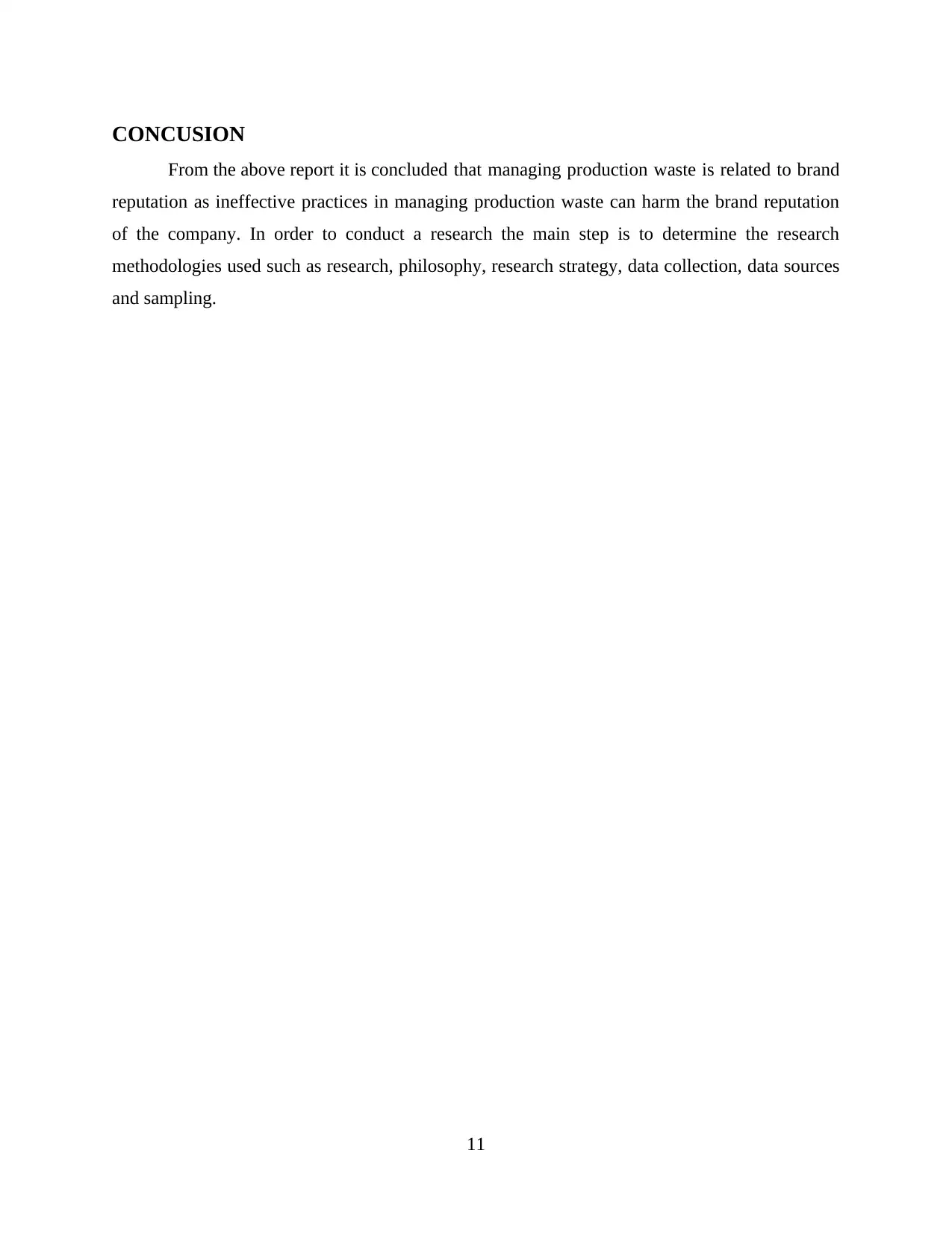
CONCUSION
From the above report it is concluded that managing production waste is related to brand
reputation as ineffective practices in managing production waste can harm the brand reputation
of the company. In order to conduct a research the main step is to determine the research
methodologies used such as research, philosophy, research strategy, data collection, data sources
and sampling.
11
From the above report it is concluded that managing production waste is related to brand
reputation as ineffective practices in managing production waste can harm the brand reputation
of the company. In order to conduct a research the main step is to determine the research
methodologies used such as research, philosophy, research strategy, data collection, data sources
and sampling.
11
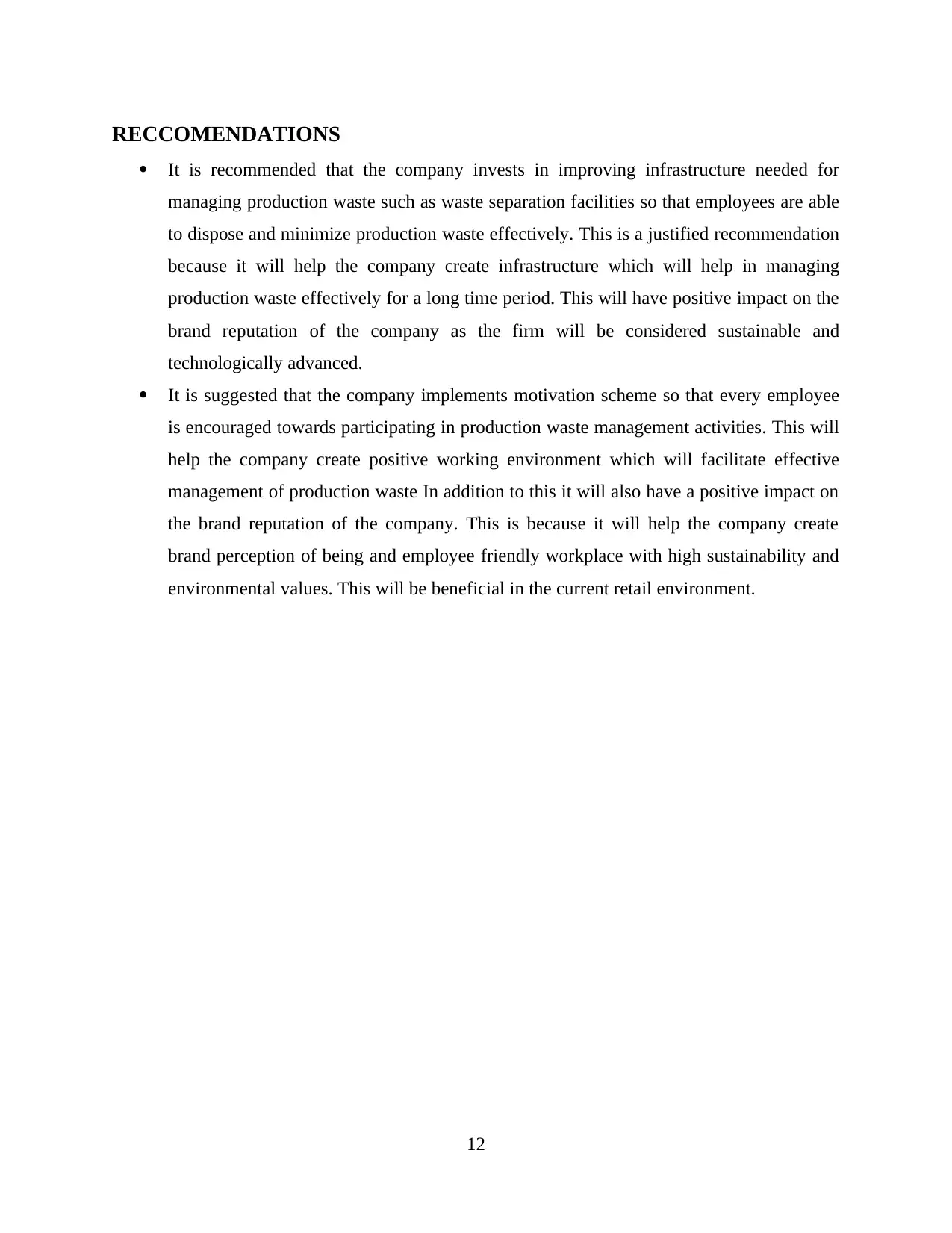
RECCOMENDATIONS
It is recommended that the company invests in improving infrastructure needed for
managing production waste such as waste separation facilities so that employees are able
to dispose and minimize production waste effectively. This is a justified recommendation
because it will help the company create infrastructure which will help in managing
production waste effectively for a long time period. This will have positive impact on the
brand reputation of the company as the firm will be considered sustainable and
technologically advanced.
It is suggested that the company implements motivation scheme so that every employee
is encouraged towards participating in production waste management activities. This will
help the company create positive working environment which will facilitate effective
management of production waste In addition to this it will also have a positive impact on
the brand reputation of the company. This is because it will help the company create
brand perception of being and employee friendly workplace with high sustainability and
environmental values. This will be beneficial in the current retail environment.
12
It is recommended that the company invests in improving infrastructure needed for
managing production waste such as waste separation facilities so that employees are able
to dispose and minimize production waste effectively. This is a justified recommendation
because it will help the company create infrastructure which will help in managing
production waste effectively for a long time period. This will have positive impact on the
brand reputation of the company as the firm will be considered sustainable and
technologically advanced.
It is suggested that the company implements motivation scheme so that every employee
is encouraged towards participating in production waste management activities. This will
help the company create positive working environment which will facilitate effective
management of production waste In addition to this it will also have a positive impact on
the brand reputation of the company. This is because it will help the company create
brand perception of being and employee friendly workplace with high sustainability and
environmental values. This will be beneficial in the current retail environment.
12
⊘ This is a preview!⊘
Do you want full access?
Subscribe today to unlock all pages.

Trusted by 1+ million students worldwide
1 out of 13
Related Documents
Your All-in-One AI-Powered Toolkit for Academic Success.
+13062052269
info@desklib.com
Available 24*7 on WhatsApp / Email
![[object Object]](/_next/static/media/star-bottom.7253800d.svg)
Unlock your academic potential
Copyright © 2020–2025 A2Z Services. All Rights Reserved. Developed and managed by ZUCOL.




